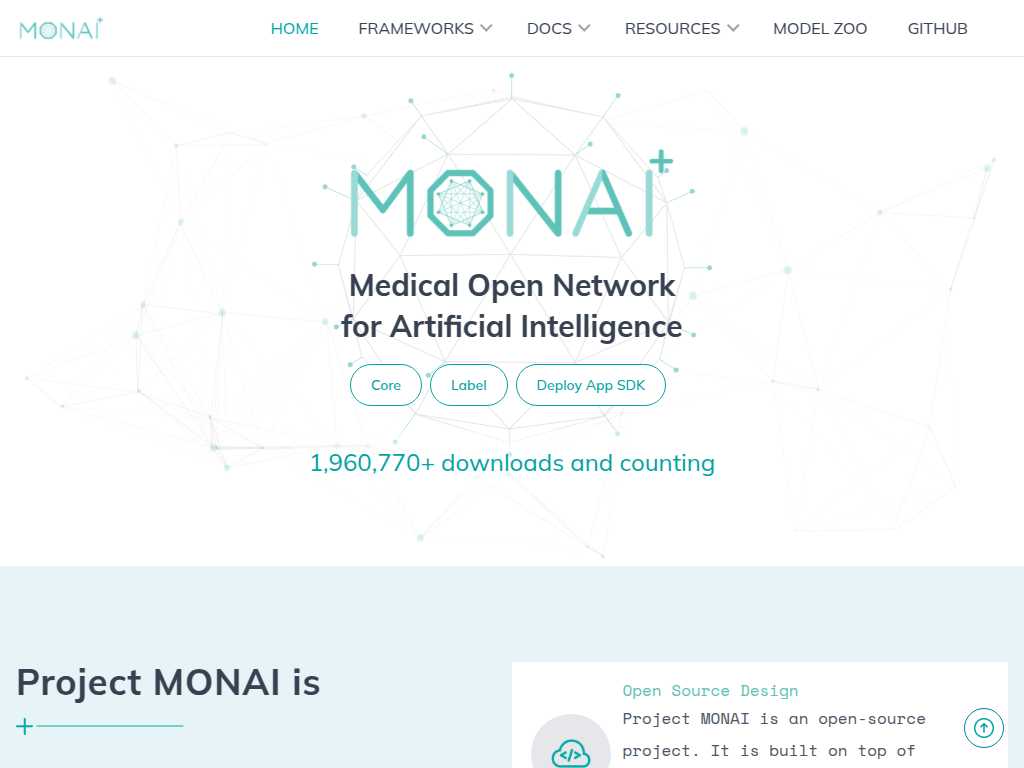Monai
Healthcare

Accelerate AI model development in healthcare imaging with MONAI.
Average rated: 0.00/5 with 0 ratings
Favorited 0 times
Rate this tool
About Monai
MONAI, an open-source framework developed on PyTorch, is specifically designed to enhance AI model development in healthcare imaging. Its primary focus is to expedite the creation and deployment of machine learning models in the medical imaging domain, fostering collaborative efforts among researchers, developers, and clinicians worldwide. This community-supported initiative offers a standardized and optimized approach to crafting and evaluating deep learning models, with the overarching goal of advancing healthcare practices. Key features of MONAI include flexible preprocessing techniques suited for handling multi-dimensional medical images and a set of compositional APIs that are both modular and portable, facilitating their seamless integration into existing workflows. The framework provides domain-specific implementations such as specialized networks, losses, and evaluation metrics that are tailored for medical imaging tasks. MONAI's design is highly customizable, catering to users regardless of their expertise levels, and it offers support for multi-GPU and multi-node operations, which enhances processing speeds during training and inference. MONAI Label is one of its standout features, offering AI-assisted image labeling tools that significantly reduce the time and effort involved in annotation tasks. Additionally, MONAI Core delivers extensive domain-specific capabilities for training AI models, including medical image transformations and state-of-the-art 3D segmentation algorithms. MONAI Deploy further extends its utility, aiming to standardize the lifecycle of medical AI applications in clinical settings, from development and testing to deployment. The tool finds versatile applications across various sectors, with use cases spanning image segmentation, classification, and registration, as well as synthetic image generation and pathology detection. MONAI's advanced capabilities particularly benefit fields such as radiology, oncology, cardiology, and neurology by supporting improved diagnostic accuracy and efficiency. Distinctive for its open-source model, MONAI fosters a communal environment for innovation and development. Its focus on medical imaging ensures users have access to tools and optimizations specific to this domain. The framework's seamless integration with existing systems and its high-performance GPU-accelerated processes further enhance its appeal. Comprehensive documentation and tutorials support users at all levels, enhancing the tool's accessibility and usability. Technically, MONAI is developed primarily in Python and operates atop PyTorch. To achieve optimal performance, access to NVIDIA GPUs with CUDA support is recommended, reflecting its need for robust computational resources aligned with the task complexity. MONAI's integration capabilities extend to various platforms, including PyTorch for foundational AI tasks, 3D Slicer for medical image analysis, and other custom viewers via APIs. It also supports integration with clinical systems like PACS, RIS, and EHR through MONAI Deploy. The tool has achieved notable accomplishments, with over 700,000 downloads in 2022, integration into more than 500 GitHub projects, and citations in over 150 research papers. Its use in significant conferences and challenges such as MICCAI underscores its impact and relevance. Recent developments include the release of MONAI Bundle, Model Zoo, Federated Learning, and Experiment Management tools, reflecting ongoing enhancements in its functionality and reach.
Key Features
- Open-source framework built on PyTorch, promoting community-driven collaboration
- End-to-end support for the entire medical AI model development workflow
- Domain-specific features for healthcare imaging, including state-of-the-art 3D segmentation algorithms
- Emphasizes standardized and reproducible AI development practices
- User-friendly interfaces with intuitive API designs for researchers and developers
- Offers flexible pre-processing capabilities for diverse medical imaging data types
- Utilizes GPU acceleration for improved performance, with features like 'Smart Caching'
- Easily integrates into existing workflows through compositional and portable APIs
- Comprehensive documentation and tutorials support both novice and expert users
- Access to a model zoo with pre-trained models for enhanced research efficiency